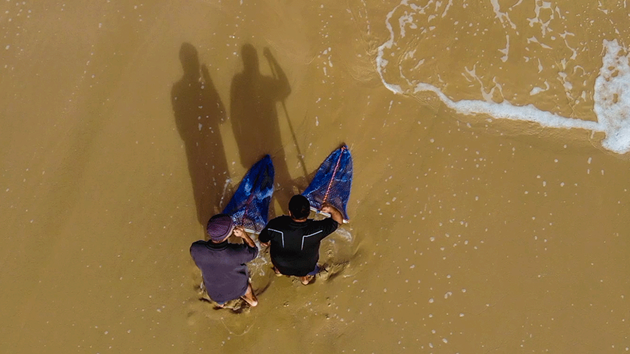- Today, over half of all wild-caught fish in Australia are certified sustainable to the world-class MSC Fisheries Standard.
- Australia provides a diverse range of MSC-certified species to national and international markets, with 38 species certified.
- MSC-certified fisheries in Australia make continuous improvements. Over 116 improvements relating to bycatch, ecosystem impact, and effective management between 2000-2022 have been made.
- Stakeholder engagement plays a crucial role in driving fishery improvements.
The Marine Stewardship Council (MSC), an international non-profit on a mission to end overfishing by setting the world's leading standards for sustainable fishing and supply chain assurance, has unveiled two decades of transformative progress in Australian fisheries since 2000.
Released on World Fisheries Day, the 2023 Fishing for the Future Report is the first of its kind. It provides a detailed analysis of the positive environmental impacts made by fisheries that have chosen to be assessed against the MSC Fisheries Standard since 2000.
The report underscores the collective endeavour driving more than 116 improvements in sustainable fisheries to reduce bycatch, reduce ecosystem impact, and increase effective management. With engagement from governments, environmental NGOs, and other industry bodies, the MSC program sets a precedent for responsible practices worldwide.
In Australia, 28 MSC-certified fisheries, comprising 38 species, make up 52% of the total volume of wild-caught seafood. This achievement surpasses the MSC's global goal of over a third of global marine catch (by volume) to be MSC certified or engaged by 2030. It adds to Australia's proud history of having the world's first and longest MSC-certified fishery, the WA Rock Lobster fishery.
The ocean harbours 80% of the planet's biodiversity, and over the past fifty years, fishing has emerged as the primary factor affecting marine biodiversity. Ensuring sustainable fishing practices is essential for meeting the protein dietary needs of a growing global population and reducing the environmental impact.
Stakeholder participation in MSC fishery assessments contributes to more robust fishery performance at a time when fishing impacts on the ocean are exacerbated by pollution and climate change. Data from the report shows that the most engaged stakeholders in Australia are environmental NGOs such as WWF and AMCS, government bodies, and scientists.
MSC Program Director of Oceania and Singapore, Anne Gabriel calls attention to the importance of sustainable fishing practices in Australia and the world. "As the third largest marine jurisdiction in the world, we as Australians, have an accountability to ensure our ocean is conserved and managed with care. Sustainable fishing is imperative in maintaining healthy fish populations and preserving ocean and freshwater wildlife while supporting livelihoods and securing nourishment for a growing population."
"I hope the 2023 Future of Fishing report showcases the tangible, optimistic outcomes of sustainable fishing in Australia while emphasising the importance of strong leadership and collaboration towards continuous improvement. The report shows a diverse group engaged in the assessment and certification process of Australian fisheries due to its important economic, environmental, and social outcomes." Says Ms Gabriel.
The report highlights examples of crucial improvements. In Western Australia, the Western Rock Lobster fishery introduced an innovative Sea Lion Exclusion Device – a modification to pots and traps that block access to juvenile sea lions while still allowing lobsters to be caught. Changes to long-line fishing of the Australian Eastern Tuna and Billfish were made to reduce interaction and impact on turtles and mako sharks. Implementing Crew Member Observer Plans by the Exmouth Gulf and Shark Bay Prawn Fisheries has improved the identification and release of sea snakes in bycatch.
"Using the MSC framework, our fishery continues to monitor, respond and innovate. For example, in 2015, new mitigation measures were implemented to greatly reduce the risk of whale entanglements in the fishery during their migration season." Kim Colero, Chair of the Western Australia Rock Lobster Council.
While data results show a positive trend in continuous improvement through the MSC program, Ms Gabriel urges more stakeholders to contribute and participate, "While businesses and consumers in Australia are showing growing interest and commitment by choosing sustainable seafood, I would like to encourage steadier momentum from seafood brands, suppliers, retailers, caterers, restaurants, airlines industry, cruise/shipping companies, pet food brands and any organisation that deal with seafood in one way or another. I hope this report shows the business community what is possible when fisheries commit towards an international science-based benchmark for sustainable fishing."
MSC-certified fisheries must undertake annual surveillance audits where improvements are often made to maintain certification. Every five years, the MSC updates its standards to keep pace with the most up-to-date research, science, and technology available in sustainable fishing. Fisheries volunteer to be assessed by a third party, Conformity Assessment Body, against the MSC Fisheries Standard. By remaining independent from the certification process, the MSC meets best practice guidelines for standard-setting organisations as set out by ISEAL and the United Nations Food and Agriculture Organisation.
Shopping for sustainable seafood is made easy by looking for the MSC blue fish tick label on over 370 products in Australia.



